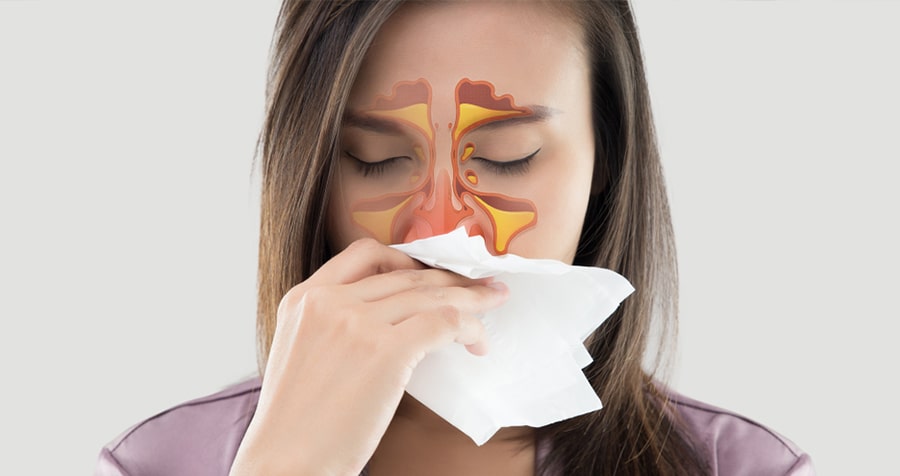
ENT specialists probably see more patients with problems of the nose and sinuses than any other area of the head and neck. Typical symptoms related to this area include allergies, nasal obstruction, mucous drainage, headaches and post-nasal drip.
Sinusitis refers to the inflammation of the tissues in the sinus cavity. It is a predominantly occurring disorder.

Allergies are the abnormal or exaggerates response of the immune system to foreign bodies. What triggers allergies varies with each person. There are tests available to identify the cause of allergy in a person. Allergies can be controlled with medication and lifestyle modifications.
Anaphylaxis is a form of severe allergy which can be fatal. It requires immediate, emergency medical care. Symptoms include a skin rash, nausea, vomiting, difficulty breathing and shock. Sinus and Allergy are one of the most commonly encountered problems in an ENT clinic. They can significantly affect quality of life and require treatment.
Sinus infection, also called sinusitis, occurs when the nasal passages become inflamed. This common condition affects many people every year. When you have a cold or allergies, for example, the airways become blocked with bacteria-filled mucus—these bacteria can multiply and cause an infection.
Sinus infections are more common in people who have a deviated septum or nasal polyps. People with a weak immune system are also more likely to get sinusitis.
Children can be more susceptible to sinusitis if they go to daycare or preschool, and it’s more common among children who use a pacifier, drink from a bottle or are exposed to secondhand smoke. Smoking is a risk factor for adults—that’s because smoke irritates the nasal passages.
Acute sinusitis has similar symptoms to a cold. These include facial pain, sneezing, and a runny or stuffy nose. A sinus infection can last two to four weeks. However, some people have chronic or recurrent sinusitis
Other symptoms of a sinus infection may include:
Sinus infections most often develop from the common cold, so taking steps to protect yourself from the cold, like washing your hands frequently, can prevent sinus infections. You may also want to use a humidifier in your home to help keep sinuses moist and prevent infection from occurring. If you smoke, quitting can also reduce your risk.
Call the doctor if you have symptoms of a sinus infection. He or she can recommend the best treatment for you.
When the sinus drainage pathways are inflamed or obstructed, a sinus infection can occur, causing facial pain and pressure, congestion, fatigue, fever, and yellow or green nasal discharge. Your doctor may prescribe nasal decongestants and antibiotics. If sinus infections happen frequently, endoscopic sinus surgery may be recommended to clear blockages that contribute to poor nasal drainage.
Nasal obstruction can result in nasal congestion, nosebleeds, headaches, facial pain, postnasal drip, loud breathing, snoring, and sleep apnea. The most common causes of nasal obstruction are deviated nasal septum, nasal turbinate enlargement, and nasal polyps.
Many types of physicians including general and family practice physicians, pediatricians, and allergists may prescribe medication for sinusitis. However, if you have chronic sinusitis or if your symptoms do not improve with medication, you may be referred to an Ear, Nose, and Throat (ENT) doctor, or Otolaryngologist, who can discuss additional options to treat your chronic sinusitis.
Sinusitis may be treated with natural therapy such as inhaling steam or using saline nasal sprays, or ENT doctors can prescribe medications such as antibiotics and nasal steroid sprays. However, clinical studies show up to 60% of sinusitis sufferers do not get relief with medication. 2 For patients who do not respond adequately to medications, an ENT doctor may recommend either a Balloon Sinuplasty procedure or traditional sinus surgery. Traditional sinus surgery removes bone and tissue to enlarge the sinus opening with the aim of clearing blocked sinuses and restoring normal sinus drainage. With this procedure, sinus surgery recovery may be associated with pain and scarring.
Balloon Sinuplasty is an innovative, minimally invasive procedure that ENT doctors use to treat patients with sinusitis. A tiny balloon is placed into the nose to reach the blocked sinuses and then inflated to restructure the sinus opening. The procedure is safe and effective.
It can be difficult to tell the difference between a cold, allergies, and a sinus infection. The common cold typically builds, peaks, and slowly disappears. It lasts a few days to a week. A cold can transform into a sinus infection. Nasal allergy is inflammation of the nose due to irritating particles (dust, pollen, and dander). Symptoms of a nasal allergy can include sneezing, itchy nose and eyes, congestion, runny nose, and post nasal drip (mucus in the throat). Sinusitis and allergy symptoms can happen at the same time as a common cold.
You can’t spread bacterial sinusitis, but you can spread viruses that lead to sinusitis. Remember to follow good hand washing practices, to avoid people if you are sick and to sneeze or cough into your elbow if you have to sneeze or cough.
Your healthcare provider will ask you a lot of questions in order to develop a detailed medical history and find out about your symptoms. They will also do a physical examination. During the exam, your care provider will check your ears, nose and throat for any swelling, draining or blockage. An endoscope (a small lighted/optical instrument) may be used to look inside the nose. In some cases, you might be referred to an ear, nose and throat (ENT) specialist. If you needed an imaging exam, your provider would order a computed tomography (CT) scan.
Many sinus infections are caused by viruses, the ones that cause the common cold. These types of infections are not cured by antibiotics. Taking an antibiotic for a viral infection unnecessarily puts you at risk for side effects related to the antibiotic. In addition, the overuse of antibiotics can lead to antibiotic resistance, which may make future infections more difficult to treat.
What Our Happy Patients Had To Say !!